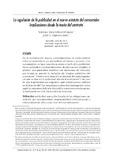La regulación de la publicidad en el nuevo estatuto del consumidor. Implicaciones desde la teoría del contrato
Compartir este ítem
Fecha
2015-12-31Autor
Echeverri Salazar, Verónica María; Universidad de Antioquia
Ospina Gómez, Julián E.; Universidad de Antioquia
Citación
Metadatos
Mostrar el registro completo del ítemDocumentos PDF
Resumen
En la contratación masiva contemporánea, el acercamiento entre los productores y/o proveedores de bienes y servicios y los consumidores se hace mayoritariamente a través de la publicidad. Dicha publicidad contiene elementos de información dirigidos al público, que pretenden modificar sus decisiones de consumo, por lo que se permite la inclusión de “elogios subjetivos del anunciante”. Frente a esta situación se plantean dos interrogantes: ¿lo que se dice en la publicidad vincula al anunciante? Y en caso de que la publicidad sea engañosa ¿qué consecuencias jurídicas se derivan de ello? Las respuestas a estos dos interrogantes varían según la naturaleza de la relación jurídica que exista entre las partes, la cual puede ser civil, mercantil o de consumo. In the contemporary mass hiring, the rapprochement between producers and/or suppliers of goods and services and the consumers is achieved mainly through advertising. This advertising has information elements aimed at the audience that intend to modify their consumption decisions, that is why the inclusion of “subjective compliments by the advertiser” is allowed. Two questions arise from this situation: does what is said in the advertisements bind the advertiser? And in the case the advertisements are actually misleading, what juridical consequences branch out from that? The answers to these two questions vary according to the nature of the juridical relation existing between the parties, which can be civil, commercial or of consumption.


